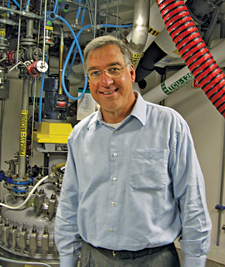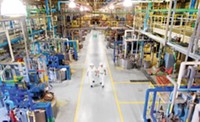Advertisement
Grab your lab coat. Let's get started
Welcome!
Welcome!
Create an account below to get 6 C&EN articles per month, receive newsletters and more - all free.
It seems this is your first time logging in online. Please enter the following information to continue.
As an ACS member you automatically get access to this site. All we need is few more details to create your reading experience.
Not you? Sign in with a different account.
Not you? Sign in with a different account.
ERROR 1
ERROR 1
ERROR 2
ERROR 2
ERROR 2
ERROR 2
ERROR 2
Password and Confirm password must match.
If you have an ACS member number, please enter it here so we can link this account to your membership. (optional)
ERROR 2
ACS values your privacy. By submitting your information, you are gaining access to C&EN and subscribing to our weekly newsletter. We use the information you provide to make your reading experience better, and we will never sell your data to third party members.
Pharmaceuticals
Gilead Builds For Speed
Biopharmaceutical firm takes the next step in securing an early-stage manufacturing base
by Rick Mullin
April 9, 2007
| A version of this story appeared in
Volume 85, Issue 15

WHEN GILEAD SCIENCES purchased Degussa's Raylo business in Edmonton, Alberta, last year, the news registered as a Degussa story. The German firm was relinquishing its only North American custom pharmaceutical chemical manufacturing plant as it set out to form partnerships in Asia instead.
Gilead's motive for purchasing the plant of one of its lead contract manufacturers, however, was less clear. "I heard a lot of 'What the hell are these guys thinking about?' " recalls James Bruno, director of consulting firm Chemical & Pharmaceutical Solutions.
After all, Gilead, like other biopharmaceutical firms, had succeeded by investing in the discovery or acquisition of new drug candidates and relying on third parties to manufacture its products. But according to Bruno, a close look at Gilead's growth in recent years—especially its purchase of biotech drug firms with therapeutic candidates in late-stage development—shows that the company had good reasons to increase its stake in chemical manufacturing.
Gilead's revenue growth of nearly 50% last year to $3 billion made it one of the world's fastest growing drug companies. The firm has 10 drugs on the market, including four HIV therapies and the influenza drug Tamiflu, as well as six drugs in clinical trials. Its sales of HIV drugs surpass those of industry majors such as GlaxoSmithKline and Bristol-Myers Squibb.
According to Ernie Prisbe, Gilead's vice president of chemical development, keeping things moving is all about moving fast.
And about building for speed. The $146 million Raylo acquisition, Prisbe says, affords Gilead a chemistry process development and pilot-scale launch pad. The company will still go to the contract manufacturing market for about 80% of its active pharmaceutical ingredient (API) needs. But the Edmonton plant will allow Gilead better control of the time-consuming early stages of preparing for an Investigational New Drug (IND) filing with the Food & Drug Administration, Prisbe says. Better control of early-stage chemical development will enable the company to smooth the road to commercialization by handing highly advanced processes to its manufacturing partners.
The Raylo acquisition, according to Prisbe, is only Gilead's latest step in building an in-house manufacturing base. A visitor entering what appears to be a typical office building in Foster City, Calif., soon comes across the small pilot chemical facility that the company built 15 years ago. "Like many other pharmaceutical companies, we realized that early availability of APIs is often the bottleneck to getting preclinical studies going," Prisbe explains. "We figured that by bringing this in house, we're probably cutting six months off our time to an IND."
The comparison with pharmaceutical companies is an apt one, given that Gilead, unlike protein-based biotech firms such as Genentech and Amgen, manufactures small-molecule therapeutics. The company is also distinct from many of the biotech firms that it is compared with in that it enjoys a sizable product list, an active pipeline, and immense profits.
Finding the right balance between in-house and outsourced manufacturing is an ongoing challenge. At no point, however, has Gilead considered scaling up toward commercial drug production, which Prisbe likens to running a chemical business. "Our pretax profit margins for the past four or five years have been running at about 50%," he says. "For chemical companies, it's at about 15%. It's never an attractive choice to build your own plant."
THE BALANCE worked well over the years, Prisbe says, although the occasional spike in activity did send the company into contingency mode. In 1996, for example, Gilead had to rent reactor space from its neighbor at the time, Catalytica in Mountainview, Calif., to handle production of Tamiflu for Phase I and II trials.
Gilead began contracting with Raylo at about the time it built its pilot plant. "They were already qualified to manufacture four of our products, including two major ones," Prisbe says. Over the years, Gilead and Degussa, which bought Raylo from Laporte in 2001, developed a close relationship, and Degussa will continue to manufacture for Gilead under a contract negotiated as part of the sale.
But in recent years, the number of new drugs in development at Gilead was such that it made sense to take control of a plant with Raylo's capabilities. Gilead's acquisitions of Myogen and Corus Pharma last year brought in three candidates in Phase III clinical trials: aztreonam lysine, which is an inhalable cystic fibrosis therapy from Corus, and the hypertension drugs ambrisentan and darusentan from Myogen. And the company was in the midst of launching Atripla, an HIV drug that includes emtricitibine, which Gilead acquired from Triangle Pharmaceuticals in 2003.
Shepherding products toward commercialization was creating a risk management challenge for Gilead. "As we brought in outside compounds through acquisition, there was often a need to move toward commercialization with launch quantities of material," Prisbe says. "And to mitigate the risk of relying on the company that we acquired, we felt it would be good to have the capability in-house to quickly take over the API manufacture of these new products."
The small plant in Foster City was insufficient to handle the chemical production work. Gilead was also anxious to fortify its process research group as the pipeline filled, Prisbe says, adding that "the Raylo acquisition solved many of these problems."
Gilead is investing in its new Edmonton site, including a pilot plant that will bring total reactor capacity there to approximately 22,000 gal. Prisbe notes that one of the most important features of the site is its ability to rapidly accommodate sudden surges in demand for a particular API.
But the value of the facility goes beyond the capacity to produce initial launch quantities of several APIs at one time, Prisbe says. "The facility provides R&D services and lowers our regulatory risk because we know the compliance situation," he says. "Once a product matures and we need greater volume, there is enough capacity out there through our contractors to take over."
Noting that Gilead is awaiting final approval on a New Drug Application filed last year for ambrisentan, Prisbe points to yet another potential benefit of the Edmonton plant—it can serve as manufacturing backup to its outside contractors. "If you have a second source, you essentially double your chances of having a successful preapproval inspection," he points out. "It is the same as you go forward with your launch quantities; controlling manufacturing in-house will essentially guarantee that we are going to have enough material."
Bruno says the timing of the acquisition was ideal, given the recent influx of new drug candidates at Gilead. "They have a number of complex molecules in their pipeline, and this helps get them into the clinic," he says. "But it is not such an overwhelmingly large asset that Gilead can't manage it. These are the right assets at the right time."
Gilead seems well-positioned for future growth. In addition to its new process development and pilot production base in Canada, construction is under way on a new research facility at its headquarters that will increase discovery and biology R&D by up to 40%.
"We're expanding all areas of research continually. This is an absolute necessity for pharmaceutical companies," Prisbe says. The company isn't ignoring its process research capabilities, he points out, "but we are in good shape right now with the process research in Edmonton."





Join the conversation
Contact the reporter
Submit a Letter to the Editor for publication
Engage with us on Twitter